The 5 trending attacks on the fundamental rights of LGBTI people in the EU in 2021
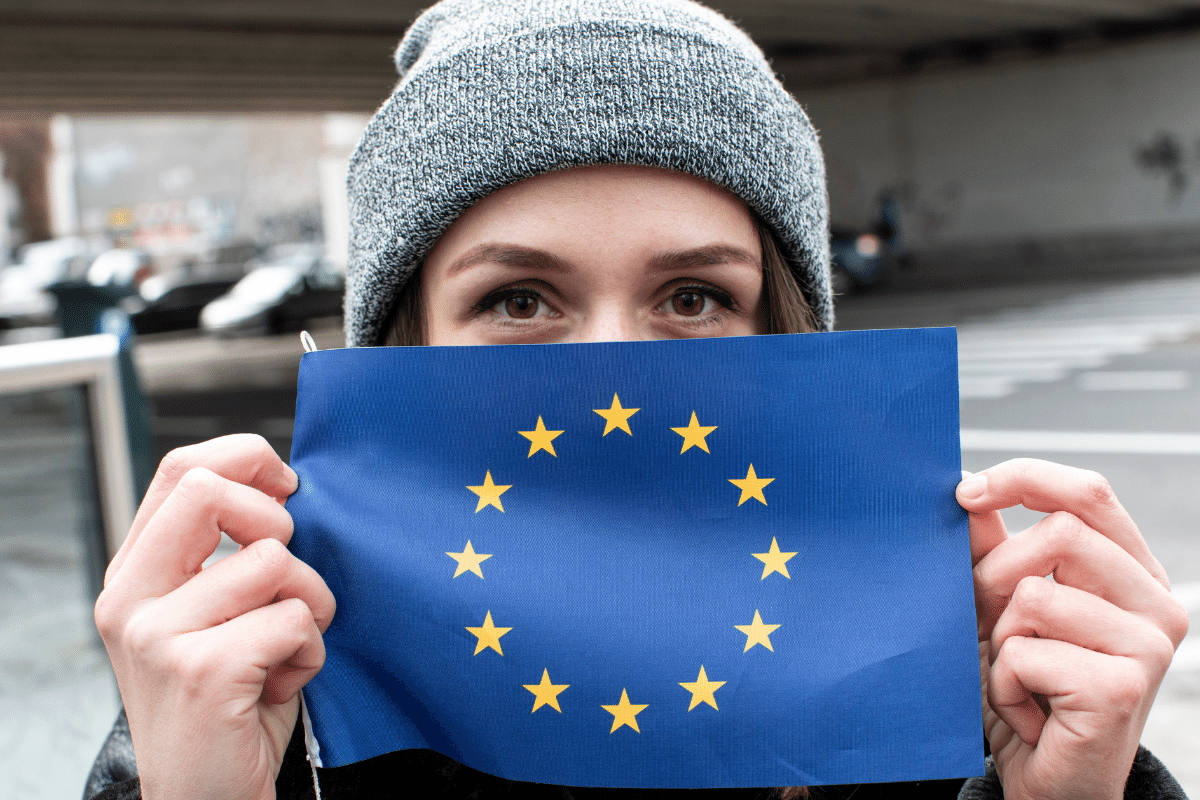
Right now, as the war on Ukraine escalates, democracy, human rights and equality matter more than ever in Europe. In our submission to the European Commission’s annual Rule of Law report, we’ve identified key trends in the systematic attacks on the rights of LGBTI people across EU member states.
With the ongoing Russian invasion of Ukraine, which is also a fundamental attack on democracy and freedom, we need to be working harder than ever to protect human rights and equality in Europe. The EU’s Rule of Law mechanism is one way in which this can be done. It can be used to ensure EU institutions react strongly to human rights violations across its member states. In the EU, rule of law means that all members of a society, including governments and members of parliaments, are equally subject to the law, under the control of independent and impartial courts.
The rule of law is important because it has a direct impact on the life of every citizen of the EU, and it ensures that laws protecting fundamental rights and democracy are respected by everyone, and can be enjoyed by everyone. It is a fundamental value upon which the EU is based.
Over the past few years it has become increasingly clear that many government-led violations of LGBTI rights in EU member states, go hand-in-hand with an undermining of the rule of law. In ILGA-Europe’s submission to this year’s EU Rule of Law Report, we’ve reported on the systematic attacks on the fundamental rights of LGBTI people across the EU, which have been enabled by the weakening of rule of law and democratic structures in several member states.
ILGA-Europe, with the input of various national-level LGBTI organisations, has submitted written input to inform the 2022 annual report, in order to ensure the violations of LGBTI rights linked to rule of law deterioration are recognised by EU institutions, and are addressed in their follow-up with member states. Here are the trends which we have highlighted to the EC:
Anti-LGBTI bias
In countries where the freedom of the judiciary is weakened, we have been witnessing political interference or bias in court cases related to LGBTI rights. For example, in Poland, the Ministry of Justice uses its powers to repeatedly appeal verdicts that were in favour of LGBTI defendants.
Also, in countries where media freedom is under attack, we are seeing more prevalence of anti-LGBTI bias, smear campaigns and even censorship of LGBTI content. Some LGBTI organisations are facing funding restrictions.
Arbitrary use of COVID-19 regulations
In certain countries, COVID-19 regulations have been applied in a discriminatory manner or have been used arbitrarily to restrict the freedom of assembly of LGBTI people. States of emergency have allowed governments to fast-track legislation unrelated to the pandemic, but which directly attack the rights of LGBTI people.
The most well-known example of this is the anti-paedophilia legislation adopted by Hungary in June 2021, which includes provisions which ban the “portrayal and the promotion of gender identity different from sex at birth, the change of sex and homosexuality” for persons under 18, and applies these to a number of regulations related to child protection, family, education, media and advertisement.
The European Commission started infringement proceedings against Hungary due to this law in July 2021. A similar law has since been tabled in Slovakia, is being drafted in Romania, and has been suggested for drafting in Poland and Croatia.
Judgments are not implemented
Judgments of the Court of Justice of the EU (CJEU) or the European Court of Human Rights (ECtHR) continued to not be implemented last year. The most notable of these is the Coman case from 2018, on freedom of movement for same-sex spouses. Due to its non-implementation in Romania, the country where the case started, it has been taken to the ECtHR. An official complaint was also submitted to the European Commission, with a similar case.
Rise in hate crime and hate speech against LGBTI people
Across the EU, hate speech by politicians was a serious issue during 2021, creating an unsafe environment for LGBTI civil society and often being related to a rise in hate crime and hate speech against LGBTI people more broadly. In some EU countries, LGBTI activists are receiving death threats online. In 2021 alone, offices of LGBTI organisations were attacked in Belgium, Bulgaria, Ireland, the Netherlands, Romania, and Spain. Staff and volunteers of LGBTI organisations were also attacked in Bulgaria, Croatia, Finland, Lithuania, Romania and Slovenia, many of which happened after anti-LGBTI smear campaigns in the media. Stickers with the design of the Polish “LGBT-free Zone” sticker appeared in various cities in Belgium, Bulgaria and Latvia. These incidents have led to an effective restriction of LGBTI people’s right to freedom of association, freedom of assembly and freedom of expression.
Hate crimes are not investigated
Hate crimes against LGBTI people often are still not sufficiently investigated. A number of EU countries still do not have hate crime legislation with sexual orientation, gender identity or sex characteristics as aggravating grounds. In some countries which do have such legal protection, it is often not implemented properly by police, prosecutors or even Ombudspersons.
So, what can be done?
The EU has a number of tools at its disposal to ensure the respect of the rule of law in all EU countries. The European Commission (EC), the executive arm of the EU, is responsible for guaranteeing the respect of rule of law.
The EU can take specific steps against violations of LGBTI rights in member states, that is if they go against EU legislation and/or if they are rule of law violations. Instruments the EC can use in such cases include so-called infringement procedures, as we see against Hungary and Poland at the moment, triggering Article 7 of the Treaty of the EU, to suspend certain rights from a member state, as well as cuts in EU funding based on rule of law violations
The EU annual rule of law report highlights breaches of EU and national law, including erosion of democratic standards. Based on this report, the EU institutions talk with EU countries, as well as national parliaments, civil society and other stakeholders in order to address concerns and avoid deterioration.
We hope that our remarks are heard and that the EC will integrate them in its annual Rule of Law Report. LGBTI rights are human rights and must be protected the same way rule of law should be respected in every EU country.
Rising challenges for LGBTI organisations in Europe and Central Asia, new report finds
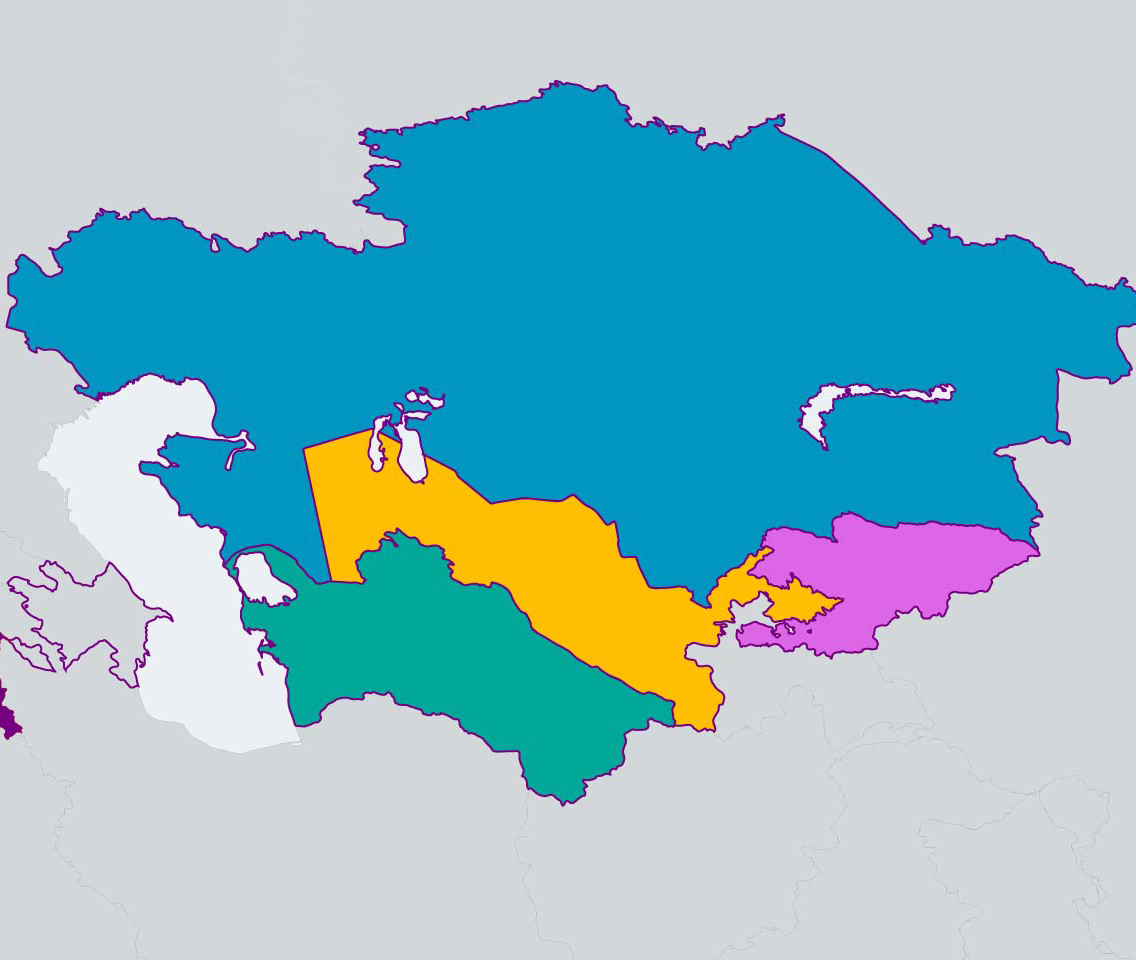
A survey of LGBTI organisations across Europe and Central Asia finds they face significant challenges in the face of growing anti-LGBTI forces, and the ongoing COVID-19 crisis.
A report launched today by Europe’s leading LGBTI organisation, ILGA-Europe indicates that LGBTI activists are struggling to resource their work amid a number of challenging factors.
The report, entitled, “Funding To Meet Changing Realities – LGBTI Organisations on the State of Funding in Europe and Central Asia, Survey 2021”, based on survey responses from 300 LGBTI organisations across Europe and Central Asia finds that:
- About one third of LGBTI organisations operate on yearly budgets under 20,000 Euro, whilst engaging in a wide variety of activities to simultaneously serve their communities and advance laws and policies to protect LGBTI people’s human rights
- Amidst the COVID-19 pandemic, organisations across the region stepped up to fill the gaps by providing services to LGBTI people that should have been provided by public authorities
- Every second LGBTI organisation in the region experiences stress and burnout due to not being able to meet the needs of LGBTI people coming in for help
Overall, 84.9% of organisations say that they have been faced with burnout issues. The most common cause of stress and burnout across was not being able to meet the needs of LGBTI people coming in for help (49.7%), responding to COVID-19 (46.1%) and having to respond to external threats from right wing, anti-LGBTI or “anti-gender” groups or individuals (43.6%).
The report further assesses challenges that LGBTI organisations face and maps the diversity of work done and communities served by organisations. About three-quarters of LGBTI organisations identified a lack of funding for the activities that are most important to their organisation as a barrier to implementing projects. They often do the most important work for them without funding, or without dedicated funding.
The report also indicates that the despite mounting workloads, burnout and growing threats and attacks, LGBTI organisations continue to widen their work, focusing on a variety of highly vulnerable groups within the LGBTI community, such as migrants, young people, and trans and gender and non-conforming people, and are in dire need of additional resources to ensure that they can strengthen these efforts.
Amongst the good news is that LGBTI organisations across the regions have grown the proportion of their own resources to support their work, for instance by getting more donations from companies and private donors.
Launching the report, ILGA-Europe Programmes, Director Björn van Roozendaal said: “Behind the rich data contained in this report there is a powerful story of LGBTI activists who amidst growing opposition, rising oppression and an unfolding pandemic have continued to stand up for their communities, reached out to those who are most affected and continued to undertake new work and build partnerships to meet today’s challenges. But resources continue to be scarce. The stark findings of this report should be a call to action to anyone who can and wants to support or step-up their commitment to support LGBTI organisations.”
Further information:
The report Funding To Meet Changing Realities – LGBTI Organisations on the State of Funding in Europe and Central Asia, Survey 2021 is written by Erin Howe and Somjen Frazer from Strength in Numbers Consulting Group for ILGA-Europe. It is based on a survey to which nearly 300 LGBTI organisations responded, as well as interviews with 21 activists.
For further comment, contact: Ana Muñoz Padrós, ILGA-Europe: ana@ilga-europe.org, +32 493 35 60 55
What has 2021 meant to the LGBTI movement in Europe? Listen to our latest podcast episode to find out this year’s highlights
As 2021 comes to an end, we have collected some of the moments, events and trends that have marked the year in the latest episode of The Frontline, ILGA-Europe’s podcast about LGBTI activism and lives in Europe and Central Asia. Read here some of the episode’s highlights and find out reasons to stay hopeful in 2022.
2021 has been a year of further lockdowns, of new strains of the COVID virus, and the uncertainty they have brought, and most of all, enormous reverberations of the unprecedented events of 2020 on people’s lives. For the LGBTI movement and communities in Europe, 2021 has also been the year of the growth of a perceived east-west divide in Europe over LGBTI rights, infringement procedures taken by the European Commission against Hungary and Poland because of their anti-LGBTI laws and programs, a sharp rise in the demonisation and isolation of trans people from the women’s movement, and an overall rise in authoritarian regimes seeking to instrumentalise LGBTI lives to limit the rights of others. So, it’s perhaps strange that our guest in this episode, ILGA-Europe’s Executive Director Evelyne Paradis finds great hope for the LGBTI movement amid the storm.
How has COVID-19 continued to affect our communities?
For LGBTI communities, visibility is of top importance. In 2021 we’ve continued to reinvent ourselves while facing new challenges such as building alliances in the digital space with people you don’t know.
The most marginalized ones in our communities have found themselves particularly isolated. On the flip side, many LGBTI activists and organisations across the region have been very resourceful and creative to meet the needs, which comes with a cost because it’s a lot of work.
“I hope there’s going to be of lightness in 2022 for activists,” says Evelyne Paradis.
Is there a divide between the east and the west of Europe?
This year we’ve seen in media and elsewhere a growth of a perceived east-west divide, also when it comes to LGBTI issues. “It is not a real divide, but it is a divide,” she says. “There is a politically driven effort to create multiple divides”.
History shows that creating an ‘other,’ creating an enemy, can help other purposes. In 2022 the work will continue to be to stay attentive in order to not fuel that perceived divide.
Infringement procedures against Poland and Hungary
“We’re in a moment of hope with the EU,” says Evelyne Paradis. “The EU is taking a lot more concrete and bold actions based on their values.” In July, the European Commission announced infringement procedures against Hungary, concerning the censorship of a children’s book portraying LGBTI characters and the prohibition of the inclusion of LGBTI people in material in schools or in media for under-18s, and Poland, concerning a refusal to clarify whether LGBTI people are discriminated against in the labour market in the country’s so-called LGBT Free Zones
A year ago, to think about infringements seemed ambitious. Starting infringement procedures was important for LGBTI communities in these countries too, and the people supporting them — in that sense there’s no divide. Although we have to be careful not to create an “us vs. them” divide, Evelyne Paradis explains, we’re also in a moment when we have to assert and act in accordance to the values that hold us together.
However, Poland and Hungary are not anomalies. They are only the tip of the iceberg as scapegoating LGBTI minorities is spreading to other places. We are at a moment when human rights cannot be taken for granted.
“Times are hard for LGBTI people in the region, not just in Poland and Hungary,” she says. ILGA-Europe has reported a lot of LGBTIphobic violence this year. Now it’s the time for politicians to do the right thing.
Where do we find hope?
“I find hope in the reaction that the publication of our Rainbow Map prompted,” says Evelyne Paradis.
The message “it’s time to reboot” was heard by governments. Politically it feels that the situation is so bad that there’s no option but to act. Many politicians and representatives have contacted ILGA-Europe along 2021, and “it’s our job to tap into that opportunity.”
ILGA-Europe statement on gender
On March 8 ILGA-Europe published a statement on gender, to reaffirm our commitment to standing up against any discourse aimed at negating the rights of some people.
The decision came from observing how harsh the situation for trans people and communities was becoming, but also “from the deep sadness at observing how the beauty of human rights language, the beauty of feminism was been used and abused to divide groups and communities,” says Evelyne Paradis.
It was also a way of saying to trans individuals that we’re here, that a vision of gender that brings us all together is at the core of ILGA-Europe’s work.
Fighting for democratic rights
For a while now, the fight has moved again to be one of fight for democratic rights and freedoms, because in some parts of the region the authoritarian tendencies are very strong again. The freedom to be in the public space with no fear of arbitrary arrests cannot be taken for granted by LGBTI people and communities, as we’ve seen in the METU Pride trials in Turkey.
The clampdown of core democratic spaces is very real and that shapes the work ILGA-Europe does, which is making sure that groups can come together in the face of repeated attacks.
Activists groups need to reconvene, “they need the comfort of coming together.” In this sense, the COVID-19 pandemic is not helping. Spaces like ILGA-Europe’s Annual Conference, that this year was moved for the second time to the digital sphere as an alternative to an in-person meeting, are spaces of restoration.
Strategic litigation as a way forward for LGBTI rights
It’s been a reason for hope to see national and European courts moving in the right direction for some years now, Evelyne explains. Some successful examples in 2021 have been METU Pride trial and Baby Sara case.
However, not because there’s a judgement it means there’s going to be a change anytime soon. There are two caveats to consider. First, it is quite telling of the current context that LGBTI people have to go to court. Second, court judgments, as positive as they can be, rely on governments to implement them. Three years after the landmark judgment issued by the CJEU against Romania, recognising that the term spouse includes same-sex spouses under EU freedom of movement laws, Romania has not implemented the Coman case yet.
“We’ve had to do a lot more work,” she says. “It’s good to see that we can use the courts more but it also doesn’t end there.”
ILGA-Europe’s Gathering Online
It was great to see that people coming together at the Gathering Online despite the screen fatigue. As in 2020, we hosted an online version of Europe and Central Asia’s LGBTI largest conference in October. The main topics discussed along the week were racism, poverty and other forms of structural inequalities that affect the movement, the political context in which we operate, and the creative responses to it.
The main message, says Evelyne Paradis, was to go back to the essence, to the belief in the importance of creating a world that is fair and just, which is the reason why all of us keep standing up for human rights and the LGBTI movement.
It is also a week when solidarity was embodied. “This is where probably I get the most hope, that we are collectively getting into that space of really seeing each other as human beings.”
Some hopes for 2022
“My hope is that as a movement we grow in sincere solidarity, that institutions and governments in Europe continue to find the courage to do the right thing and act.”
Evelyne Paradis also hopes that more and more allies and coalitions become stronger and stronger, “that we turn the tides around.”
“It’s our priority to make sure that LGBTI organisations can do their work,” she concluded.
Presented by ILGA-Europe, The Frontline is a podcast about LGBTI activism and lives in Europe and Central Asia. Deep-diving and analysing from a unique and informed perspective, The Frontline aims to bring you to the core of queer activism and give you an understanding on the complexities of what’s happening, why it’s happening, the wins and the losses, the challenges and commonalities, and the extraordinary ways in which the work of those on the frontlines continues in a rapidly changing world.
What Pride Reminds: How anti-gender forces and blocks to progress on HIV/AIDS in Europe and Central Asia are intertwined
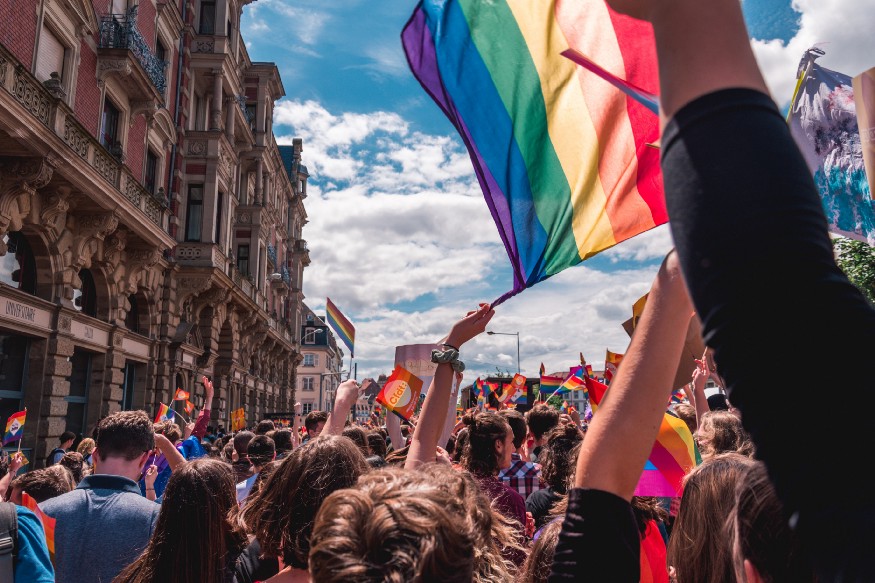
In moments like these, where even our former allies are using us to advance their own political goals, pride and its value become ever clearer.
Pride is protest and a celebration of our diversity. This June has brought a complex moment into focus — with a pride march returning to Warsaw just days after Hungary passed an “anti-propaganda” law banning the teaching of anything LGBTI-related in schools, as one governing party in Spain re-took control of the legal gender recognition law reform process from a politician who blocked the process for months and herself holds so-called “gender critical” views and a storm of online hate rocks LGBTI activists in Albania, and as the grip of the pandemic loosens in some parts of the region while others are still struggling to control the pandemic — a battle in which access to HIV prevention, testing and treatment, alongside vital care for trans and intersex people, were too frequently deprioritised.
In the context of COVID-19, LGBTI organisations across the region reported breakdowns in healthcare for trans and intersex people, as life-saving transition-related healthcare was cancelled or postponed, and as travel to a trusted doctor became difficult or impossible. For example, intersex people are frequently subjected to medical trauma, and often seek healthcare from only trusted providers, who may be far from home, even requiring cross-border travel. Due to national lockdowns and restrictions, life-saving transition-related healthcare was cancelled or postponed, and travel to a trusted doctor became difficult or impossible. Similarly, breakdowns in HIV prevention, testing, and treatment services were reported around the region. As the HIV/AIDS epidemic in Europe and Central Asia dramatically impacts gay and bisexual men and trans people, homophobia, biphobia, and transphobia remain all too prevalent, pushing LGBTI people into the closet and keeping them from seeking effective HIV interventions for fear of stigma, discrimination, and ostracisation.
This double-edged decrease in services exposed LGBTI people — as well as all people living with HIV, people with disabilities, migrants, racialised people, and systemically marginalised people — to a crisis in resources that has yet to be resolved. LGBTI organisations, as well as some HIV/AIDS response organisations, redirected resources to purely humanitarian means, dropping their vital advocacy and policy work to ensure that community members survive the COVID-19 crisis. This redirection created a chasm in the political space, which is especially dangerous — policy is moving forward, and too many of our demands fail to make it to the table.
In moments like these, where even our former allies are using us to advance their own political goals, pride and its value become ever clearer. Pride started as a protest, a riot against repression from a state determined to erase us — and most specifically those of us who are trans women, who are sex workers, who are migrants, who are Black and people of colour, those who are HIV positive. Those efforts from states remain, and we are left scrambling to meet our basic needs, let alone to advance protections of our human rights. But pride is our moment — one where we come together to heal, to regroup, to celebrate the beauty and brilliance of LGBTI people, and remains, at its core, a reminder to ourselves that we must continue to fight.
And when we fight, we win.
The shocking truth about LGBTI asylum seekers living through COVID-19 in Europe
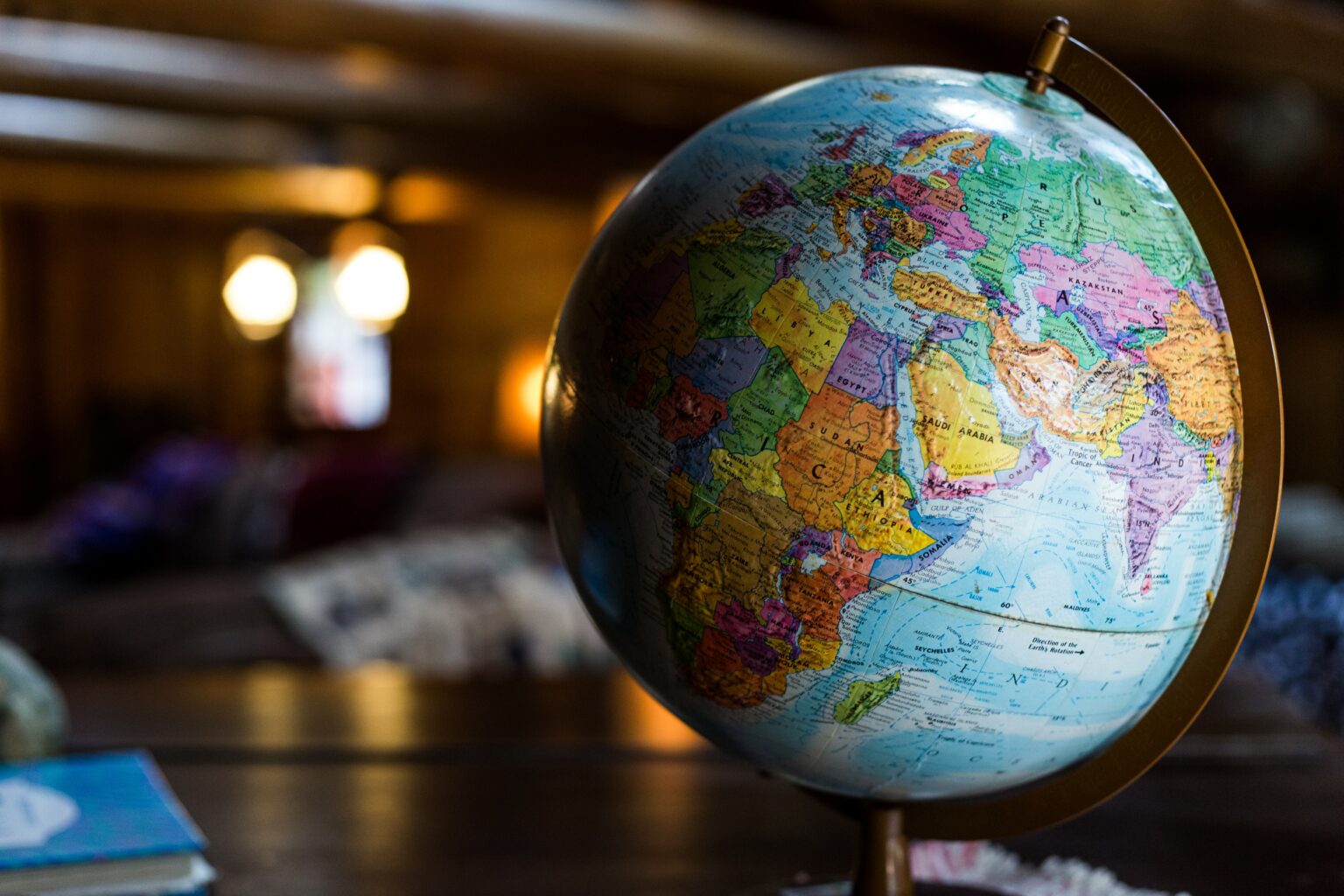
The COVID-19 pandemic and the political responses to it have hit already beleaguered LGBTI asylum seekers in Europe particularly hard. We report on the alarming impact.
“The COVID-19 pandemic has impacted everyone, but not everyone has been impacted has been impacted in the same way,” said moderator Luna Liboni at the opening of the first panel of the ‘COVID-19 and Queer Asylum Symposium’ on April 29. This is particularly true in the case of LGBTIQ persons seeking asylum and refugees in Europe, a community who already faced a double stigma and discrimination in host countries before the health crisis started.
“The EU has been too slow in the context of COVID-19,” said Professor of Law Nuno Ferreira at the symposium. “Queer refugees and asylum seekers have been absent at the debate.”
Across Europe, sexual and gender minorities can ask for international protection. However, according to findings of the Fundamental Rights Agency (FRA) in 2017, the implementation of EU asylum directives varies greatly across the region. Furthermore, there are no official statistics on the number of asylum claims based on sexual orientation or gender identity, while only a few countries in the EU have specific national guidelines for interviewing LGBTI asylum seekers.
Panellists Jonathan Mastellari, Leila Zadeh and Anbid Zaman compared the situation for LGBTIQ asylum seekers since March 2020 in the UK, Italy and Germany. Here is what the three countries have in common:
Higher risk of isolation and trauma re-triggering
The forced isolation of lockdowns re-triggered trauma in LGBTIQ asylum seekers. Many LGBTIQ asylum seekers were already distanced from their families and had arrived on their own to the host country. During the lockdowns, organisations providing support and access to the LGBTI community could do very limited work. Locked up with strangers, LGBTIQ asylum seekers were not able to talk openly or be free to themselves. Refugee camps and properties assigned to asylum seekers are often rural and far from the cities, increasing the risk of isolation by cutting LGBTI refugees and asylum seekers from access to LGBTI spaces and community.
Overcrowded centres and greater exposure to violence
In the three countries, people in refugee centres were living very close to each other at a time when it was important to keep distance. Not only would this expose asylum seekers to a higher risk of infection, but also made LGBTI people in the centres more vulnerable to verbal abuse, harassment and degrading treatment. In the UK, detention centres stopped releasing asylum seekers and suspended deportations. As a result, centres continue to be overcrowded. It was reported that some people were sharing beds in hotels and other initial accommodations. All this exposed LGBTI asylum seekers to increased harassment. In Italy, LGBTI asylum seekers experiencing violence in their homes could not access centres of protection.
Difficulties accessing HIV treatment and trans healthcare
Accessing trans-affirming healthcare was already challenging for trans asylum seekers before the pandemic. The lockdowns, limitations on mobility, and the cutting of services at medical centres have pushed trans asylum seekers and asylum seekers living with HIV to interrupt their treatments.
Before the pandemic
The situation of LGBTI asylum seekers before the pandemic hit was already beset by issues. Here are the main findings by the Fundamental Rights Agency in 2017:
- There are no official statistics on the number of asylum claims based on sexual orientation or gender identity.
- Only a few EU Member States have specific national guidelines for interviewing LGBTI persons.
- Civil society representatives note that eligibility interviews are often too short and lack specific attention to persecution based on sexual orientation or gender identity. According to NGOs, asylum officers tend to have stereotypical views on sexual orientation and gender identity. Support from civil society has a significant impact on the appropriate handling of asylum cases and applicants’ openness towards asylum authorities.
- In most EU Member States there are no special accommodation facilities for LGBTI persons, but special measures — such as transfers to single rooms — can often be taken in case of abuse or harassment. However, civil society emphasises the need to take preventive measures.
- Training on specific LGBTI vulnerabilities is provided to reception centre staff randomly, usually by relevant NGOs. Information leaflets from NGOs are often available, but usually not in all needed languages.
- Most incidents of violence or harassment motivated by bias against LGBTI asylum seekers are not reported and are not recorded as such.
- There are insufficient guidelines on the provision of specific healthcare (e.g. hormonal treatment) to transgender persons who already started treatment in their countries of origin. The interruption of treatment in such cases can have severe consequences.
#SexWork in Europe: “We are still asking for the basic things: housing, work, and respect for our identities”
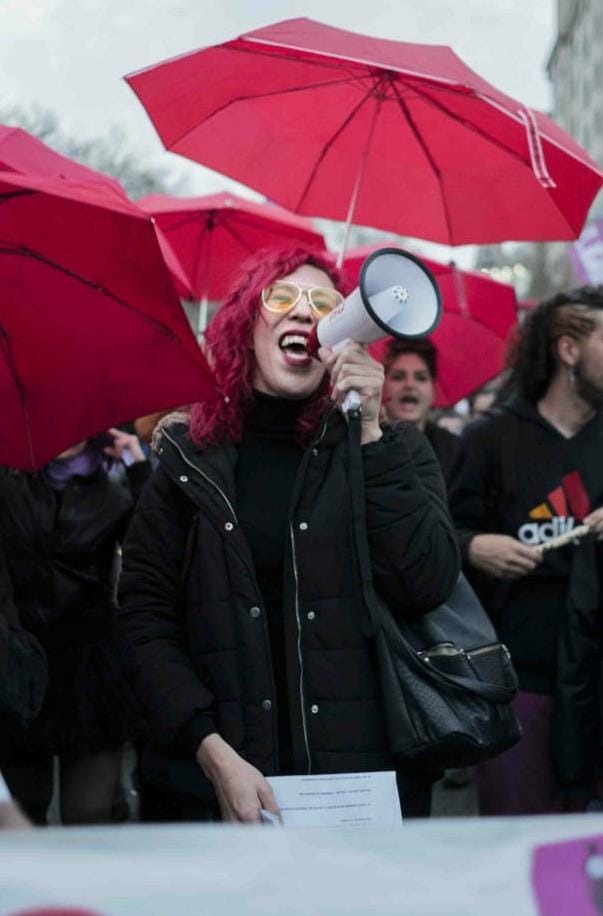
To mark #InternationalSexWorkersDay on June 2, we talked to Sabrina Sánchez, trans migrant sex worker based in Spain, on her journey, the pandemic and why sex workers rights are central to the LGBTI movement.
Sabrina Sánchez can say she’s mostly happy. Happy and tired. Last month, she attended the Trans United Europe conference in Amsterdam, supported by the No One Left Behind fund from ILGA-Europe. Just before our conversation she was at another meeting and later on the same day, she’s participating in an event organised by the Primavera Sound festival in Barcelona, the topic is “this sort of gentrification of sex workers’ aesthetics in music”. Finally, the Spanish Supreme Court has recently recognised the right of sex workers to unionise, thanks to the pledge of Spain’s Sex Workers Organisation (OTRAS). All in all, Sabrina is satisfied, but she could also take some time off.
Before joining the International Committee on the Rights of Sex Workers in Europe (ICRSE) as Programs Officer, her routine was already very similar to that of an office worker. “Contrary to what people think about sex workers, that we are only, exclusively night creatures, I wake up very early,” she says. “I have a breakfast, check my email. I try to go to the gym three times a week to keep in shape; it’s part of the business, but also to feel okay with myself.” Then, she may have an appointment with a client or may reply to questions from the sex worker’s community, all while keeping up with her personal life, making plans with a girlfriend, maybe, for a day at the beach.
Since she’s joined ICRSE, she goes to the gym less often but enjoys the financial stability. “It helps you to think better, to not worry how you’re going to have enough to pay your rent next month.” Originally from Mexico City, where she lived until the age of 25, Sabrina has been in Spain for over a decade. She doesn’t hold citizenship yet, as the bureaucratic procedures are far from straightforward.
Coming out, and a new life
“I am privileged enough to say that that I come from a family that supported my transition and my life decisions,” Sabrina says. “When my gender identity was revealed, my mother said: ‘Now there are more reasons for you keep studying. You have to go to college to get tools you will need, because it’s going to be a lot more difficult for you now.” This is a normal worry for parents to have, but, unfortunately, it’s often the contrary. Trans females are usually kicked out of the family home.”
After majoring in Communications at the National Autonomous University of México (UNAM), it was time for Sabrina to leave the country of her birth. “I knew that there was no future for transwomen in Mexico. And I always felt that that Mexico was not really my place. I didn’t belong there.”
She had some connections in Catalonia, but she hit a language barrier when she arrived. Spanish, her mother tongue, was not much help in a place where speaking Catalan is mandatory. “I decided to engage in sex work because my savings were already gone. I had no documentation, no language and I couldn’t even get a job cleaning houses.”
When COVID-19 hit
“The complete lockdown in Spain made it almost impossible for sex workers to earn a living,” she says. The measures in public spaces were not the only reason. “Everybody was watching, everybody was surveillant,” says Sabrina. “So, we couldn’t go about our work.”
The state provided insufficient protection. Those eligible for public aid only received about 60 euro per week, so sex workers collectives got together and organised a crowdfunding that raised 35,000 euro. “This sounds like a lot but it’s not much when you have you spread it among 350 people,” says Sabrina. When the lockdown relaxed and a curfew was put in place, street sex workers returned to public spaces in daylight, which got a lot of negative media attention. “Of course, they had to go back to work,” Sabrina says. “Nobody was giving them any money.”
Many regular clients disappeared because of the pandemic. “Guys were scared of getting Covid,” Sabrina explains. “Clients are usually the everyday men that surround us, they are your uncle, your dad, your brother. They didn’t want to get sick and give it to their families. Those thoughtful people, the good clients disappeared, and we were left to deal with the assholes.”
“Restrictions apart, what has affected sex workers most is the attitude of the people. In the context where sex work is criminalised, like in France, violence has risen a lot because you have this narrative of sex workers being criminals, or the ‘other’ — a group of the population who are not desirable. You can do whatever to us because we are not seen as actual workers. We are something to reject easily, or we are victims to rescue. You can give us a couple of cents and a sewing machine and should be happy now, because we are not ‘selling our bodies’.”
While across Europe we start to return to a semblance of the old days, the issues sex workers were facing before 2020 are still present. In Spain, there are two draft bills that could affect sex work, by criminalising their working premises or conflating sex work with trafficking.
“None of these laws addresses the structural problems that make us sell sex in first place,” says Sabrina. “They punish the client, but what if instead they created options for people who are in sex work because they don’t have access another jobs, people like trans women? If they created opportunties, then maybe less people would be put in a position where they have to engage in sex work. But no, they want to address socio economical problems with a penal code. That never works.
“By criminalising sex work, governments are reinforcing the scenario they say they want to save us from. Instead of regularising undocumented migrant sex workers, as has happened in Portugal, criminalisation may lead to directing more funding to anti-immigration enforcement. In countries like Sweden, who are deporting migrant sex workers, they are returning them to the hands of traffickers. They will want to come back to Europe and they will have to pay for that journey again.”
Sex workers and the LGBTI community
Sex workers have found resistance within the LGBTI movement too. Some say sex workers are not good for their image. “I’m talking mostly to the white, cis, gay men, who are the ones that have the privileges, the capital, and the money. But the ones that started the riots that ultimately led to such privilege, were two trans sex workers of colour.”
Sabrina is referring to Marsha P. Johnson and Sylvia Rivera, whose sparking of Stonewall riots over 50 years ago shaped Pride events around the world and the LGBTI movement as we know it today. However, as Sabrina asserts, Johnson and Rivera’s demands have still not been met.
“After all these years, we are still asking for the basic necessities: housing, work, and respect for our identities.”
How to build a fairer, healthier world during a global pandemic
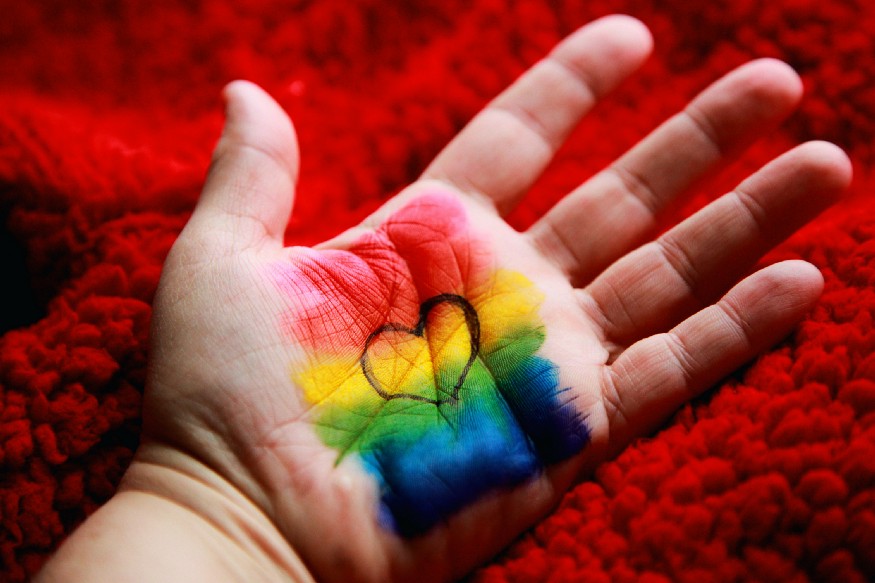
On 7 April, in the midst of an ongoing global pandemic, we celebrated World Health Day with the motto: “Building a fairer, healthier world”. But to make this a reality the voices and needs of the most marginalised, including LGBTI people, must be front and centre. Here is how ILGA-Europe and the Nobody Left Outside initiative are working together to build on this vision.
The COVID-19 crisis has made it clear that nobody is safe until everybody is safe. Health and access to healthcare is one of the seven areas where COVID-19 has hugely impacted LGBTI people, organisations and communities in Europe and Central Asia. Although the corona virus does not discriminate, already marginalised groups have been hit harder by the pandemic and yet remain among the least protected. These vulnerable communities include LGBTI people as well as people experiencing homelessness, undocumented migrants, sex workers, people who use drugs and prisoners.
The Nobody Left Outside (NLO) initiative, with the participation of ILGA-Europe, is a collective of organisations representing some of the most marginalised communities in Europe, for whom access to healthcare is not straightforward. It aims to improve healthcare access for these people and calls on policy makers in the EU, at local and international levels, to take the following critical actions:
1. Establish a knowledge platform
Marginalised groups have specific and intricate healthcare needs. However, specific expertise, research and interventions are limited and scattered across Europe. The European Commission should support the establishment of an EU-level knowledge platform to compile and share research and best practices in healthcare access for marginalised, under-served groups. This should be led by academics active in the field, in close collaboration with civil society networks and organisations.
2. Train health and social care providers
Health and social care providers often lack suitable education to deal with the complex challenges faced by marginalised communities. The European Commission should support healthcare training and capacity building via the European Social Fund+. These programmes should include suitable training to educate and enable all staff providing services for marginalised communities and peer training. They should include training to avoid stigma and discrimination, and aim to reinforce collaboration between healthcare staff and community workers. An inspiring example is Health4LGBTI, an EU funded pilot project aiming at reducing health inequalities experienced by LGBTI people.
3. Implement the NLO Service Design Checklist
The NLO Service Design Checklist helps to design and deliver health and support services that are accessible to underserved and marginalised people. The European Commission should support a pilot programme to evaluate its implementation. You can download the NLO Service Design Checklist here.
4. Support Joint Action
International collaboration between academia, advocacy organisations and healthcare providers is key to driving improvements. EU Joint Actions aim to develop tools, methods and approaches and to build capacity through collaboration. Therefore, the European Commission should support a Joint Action to improve access to health and support services among marginalised and under-served communities, which should include the implementation of guidelines for monitoring and evaluation.
5. Support funding for research into access to cancer services
Some cancers are more common in marginalised groups or have worse outcomes due to delays in diagnosis and access to care. The Horizon Europe research programme mission on cancer should support funding for research to help improve access to cancer screening and care services among people in marginalised underserved communities.
6. Make health core to all policies
Healthcare should not be taken in isolation, but in connection to lifestyle, living conditions and other socio-economic determinants. The European Commission should further prioritise a coordinated approach and consider the impacts of health policies beyond the health sector, such as the Digital Single Market.
The Frontline: LGBTI communities in Europe: Pushed to the brink
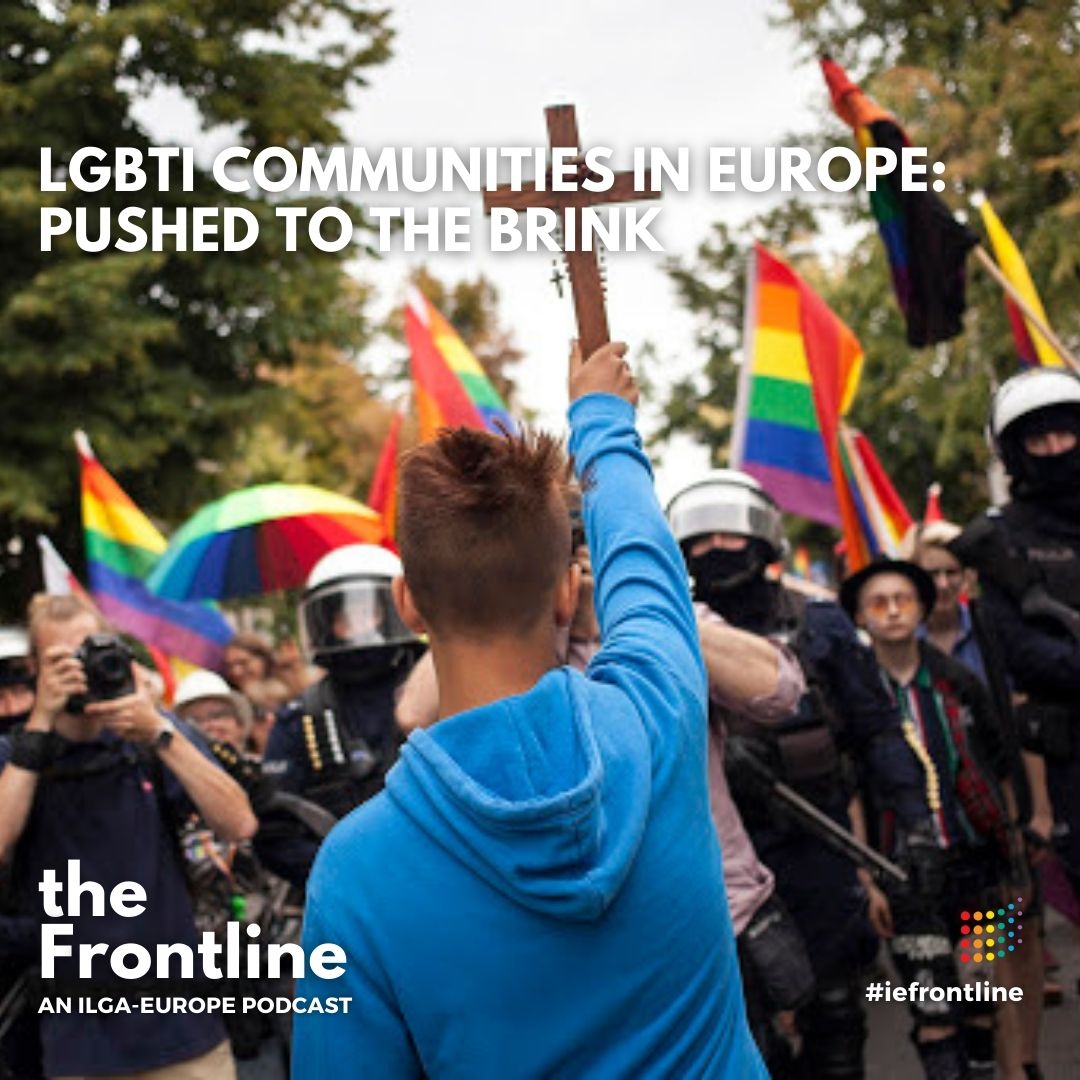
Reporting from country after country provides a glaring clarification that progress which has been taken for granted is not only increasingly fragile, but particularly vulnerable to exploitation by anti-human rights forces.
In this episode of The Frontline, we get an overview of the stark situation from ILGA-Europe’s Advocacy Director, Katrin Hugendubel. Executive Director of Transgender Europe (TGEU) talks to us about the significant growth of opposition towards trans rights across Europe; and Executive Director of ILGA-Portugal, and Marta Ramos tells us about the rise of the anti-gender movement in her country, and the ways in which LGBTI organisations have had to skew their work during the COVID-19 pandemic towards provision of basic necessities like food and shelter as many governments left LGBTI people out of their relief packages.
Listen below or click here to listen and subscribe to The Frontline on your favourite podcast platform.
No One Left Behind: A Fund to tackle LGBTI socioeconomic inequalities
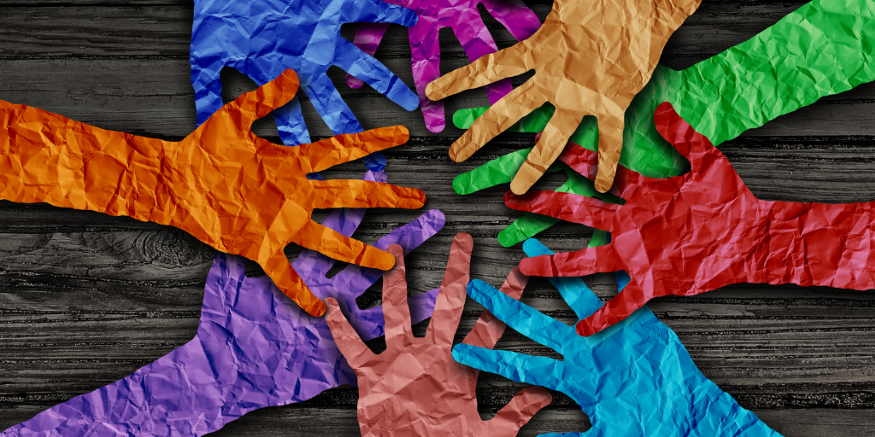
Early in June, ILGA-Europe launched the ‘No One Left Behind’ fund, an initiative to tackle persisting socioeconomic inequalities that have been exacerbated by the COVID-19 crisis. Read on to find out what it is, why we launched it and how we went about awarding 25 grants.
With ILGA-Europe’s ‘No One Left Behind’ fund, launched to tackle socioeconomic inequalities that have been intensified by the COVID-19 pandemic, we want to support LGBTI organisations in Europe and Central Asia to strengthen their skills and knowledge in relation to socioeconomic inequalities, and to try out new approaches and to help them build relevant alliances. We managed to mobilise some new resources and also reallocated some money from our own budget, which was freed up as a result of the pandemic, creating a total fund of about €380,000.
The call for proposals closed on 5 July, and we received 66 proposals. We have awarded 25 grants and with this, we have exhausted the budget that we have available.
Why the ‘No One Left Behind’ fund?
Many LGBTI organisations in Europe and Central Asia in recent years have started to talk about the importance of addressing socioeconomic rights. It is important to recognise that even when civil and political rights and legal changes such as marriage equality or non-discrimination laws are advancing in some places in our region, many members of our communities are left behind because they face structural barriers in achieving basic safeties. This is especially true for members of underrepresented communities and people whose identities intersect (including Black people and People Of Colour; lesbians, bisexual, trans, non-binary and intersex people, sex workers, Roma, refugees and asylum seekers, disabled persons, among others).
Full equality will not exist if some LGBTI people have no access to education, if they are in precarious jobs, don’t get the healthcare services that they need, when they don’t have a roof above their head or when they are silenced and invisibilised during an economic crisis. Sadly, we increasingly see that these are real lived experiences for too many LGBTI people.
When the global COVID-19 crisis unfolded, many LGBTI organisations saw no other choice than to step-in and provide basic services to their communities. The livelihoods of many communities got so heavily affected that LGBTI activists and organisations began providing food and shelter whilst also trying to maintain their roles as advocates and community organisers. COVID-19 highlighted the urgency of addressing structural inequalities and showed clearly how much deeper the impact was on those with less power, security and visibility.
So, why then does the fund not support basic needs?
COVID-19 quickly shifted the focus of many activists from being advocates and community organisers to becoming service providers.
While there was and is undoubtedly a need to meet short-term needs of LGBTI communities, in the long term, it is not sustainable for LGBTI organisations to take on that role. Not only will they never have enough resources to support basic needs of LGBTI communities at large, but becoming involved in providing shelter and food fundamentally shifts attention away from their primary roles of being advocates and community organisers. However, while it is our belief that it is first and foremost the role of governments to provide basic needs to citizens. In cases where states fail to deliver, we consider it incredibly important to build the capacity of LGBTI organisations to tackle root causes of socio-economic inequalities and to build more resilience and strength in communities in responding to this crisis and future ones.
So, what does the fund support?
We have focused support under this fund under three headings:
· Support LGBTI organisations to learn more about the socioeconomic realities of LGBTI people and to strengthen their own capacities to carry out strategic response work.
· Support LGBTI organisations to carry out advocacy work and build alliances to ensure that LGBTI people have access to services and basic needs.
· Support LGBTI organisations to campaign and communicate so that the needs of LGBTI people are brought to the centre of the political and societal agendas.
Most of the projects which received funding focus on marginalised communities, such as LGBTI Roma, sex workers, migrants — or specifically on trans communities. In all such cases we have tried to make sure that communities affected are directly involved in decision making (and in most cases lead projects themselves). Through providing funding to these projects, we will support the visibility, organising and advocacy capacities of these groups who, often, have access to fewer resources.
What kinds of projects did we support?
Amongst the projects that we supported we have seen interesting examples of work in this field. Several organisations are planning to undertake research and mapping exercises to produce reports that can be used for advocacy and communication purposes. For instance, one group aims to map the root causes of socio-economic inequality experienced by LGBTI people with mental health issues and on that basis work with experts to find ways to strengthen the resilience of this group. Another group aims to build a database of unemployment LGBT Roma people as an entrypoint for advocacy. A third group will carry out a needs assessment of LGBTIQ refugees to advocate for a dedicated emergency shelter.
We in particular supported projects that included a clear plan on how data gathering would concretely be used to lead on change.
Various projects aim at developing tools to help LGBTI people access the labour market. Other projects focus on addressing homelessness by creating new alliances, or increasing access to health-care for marginalised communities by understanding the realities of communicaties and working together with healthcare professionals.
And the list goes on.
What’s next?
Many activists and LGBTI groups have known for years about the economic hardship and exclusion which many within their communities experience in their daily lives. Issues of unemployment, economic precarity, lack of access to adequate health care and housing, have been on the radar of many LGBTI groups for a long time. However, few of us have had the resources to do extensive and transformative work on socioeconomic inequalities. We need to build our knowledge, gather data, create new alliances, develop new relationships within institutions and governments to start instigating the needed changes in public policies, etc. In short, we all have a lot to learn.
The fact that we received 66 applications from all over the region, for a call for proposals that was narrowly focused, demonstrates that there is a great need for this work. So, for the coming ten months we aim to follow the work of our grantees closely and document the learning, so that it becomes available for everyone in the movement.
This is the beginning of a journey for ILGA-Europe to learn about how we can collectively address socioeconomic inequalities, in the hope that much more of this work can be supported in the future.
COVID-19 in marginalised groups: challenges, actions and voices
Marginalised groups such as people experiencing homelessness, undocumented migrants, sex workers, people who use drugs, lesbian, gay, bisexual, transgender and intersex (LGBTI) people and prisoners are among those hardest hit by the coronavirus disease (COVID-19) pandemic, and yet are among the least protected from it by governmental actions to date.
The Nobody Left Outside (NLO) coalition has developed this briefing paper to:
1) Explain to policymakers the particular challenges and impacts of the COVID-19 pandemic and government responses among marginalised groups in Europe,
2) Recommend solutions to help improve government responses, recovery measures and inform preparedness plans,
3) Present the voices and actions of marginalised communities and civil society organisations currently working on the frontlines to support them through the pandemic and beyond.
The seven ways COVID-19 has hugely impacted LGBTI people
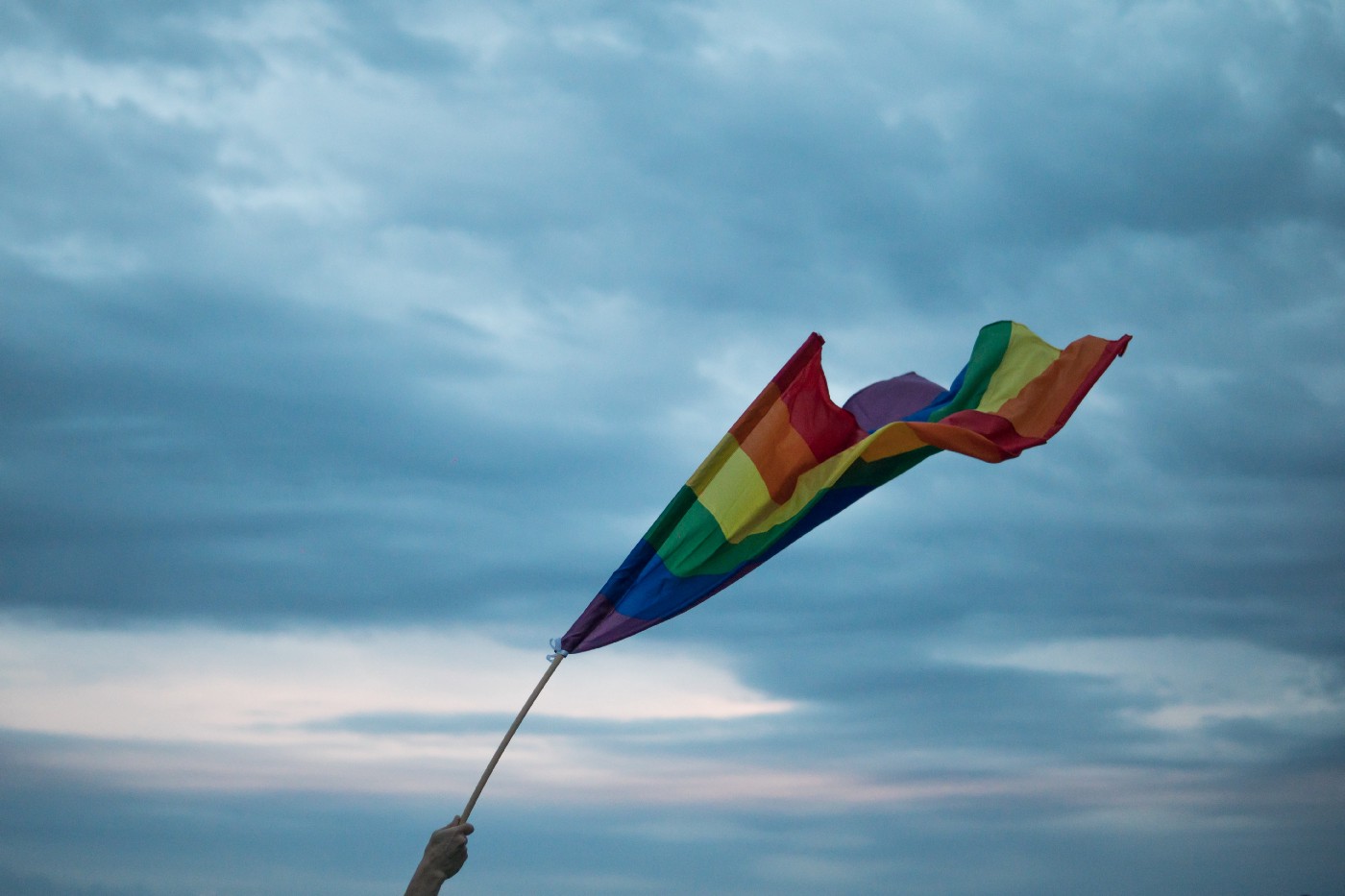
“While the Coronavirus does not discriminate, it has hit vulnerable communities disproportionately harder.” This is the conclusion of ILGA-Europe’s rapid assessment report on the impacts of COVID-19 on LGBTI people, organisations, and communities in Europe and Central Asia. In this blog, ILGA-Europe’s policy team share the seven main areas of life in which COVID-19 has specifically impacted LGBTI people.
Imagine being a young LGBTI person quarantined with a hostile family during the COVID-19 crisis. Or being a sex worker who has lost income and a place to stay. Imagine being HIV positive and finding your HIV/AIDS center has closed. For some people these were not hypothetical scenarios, instead these kinds of experiences have been their lived reality during the global healthcare crisis.
The COVID-19 pandemic has been a challenging period for everyone. However, it has been even more dreadful for already vulnerable and marginalised communities and people, who have also been negatively impacted by social distancing and other very needed prevention measures.
Based on inputs from a survey of ILGA-Europe members, direct communications, as well as public reports and webinars from members and organisations in the region, our policy team has identified seven areas where COVID-19 has remarkably impacted LGBTI people in Europe and Central Asia.
1. Health and access to health
LGBTI people have significantly lower health outcomes due to stigma and discrimination, biases held by healthcare providers, and lower socioeconomic status, which is often linked with lower access to comprehensive health insurance.e. ILGA-Europe received or observed reports from 30 countries of impacts on access to health overall in Europe and Central Asia from across Europe and Central Asia, showing how pre-existing limitations in LGBTI-affirming healthcare were exacerbated as healthcare systems redirected their resources, targeted mental health services were interrupted, or experienced radical increases in demand after moving online during confinement. Access to sexual and reproductive health were also negatively impacted.
2. Hate speech by political and religious leaders
Recent years have seen a rise in divisive and hateful rhetoric in election campaigns and public discourse, with minorities being scapegoated, and this has been translating into real hate in the streets. During the COVID-19 crisis, reports of targeted hate speech from political and/or religious leaders were received from 12 countries in Europe and Central Asia, confirming that in many countries across the region the current public health crisis is being used as another opportunity by religious leaders and hostile politicians and governments to blame LGBTI people for societal problems, further stirring up hatred against LGBTI people.
3. Domestic violence
Social distancing has proven to be particularly difficult for those who have been rejected by their families, are not out with their families, or might face LGBTI-phobia from their family members. The issue of increased incidence of domestic violence towards LGBTI people who found themselves in lockdown with their families was striking, with reports coming from 23 countries. Experiences of family rejection significantly impact on the mental health and stress levels of LGBTI people and can lead to harassment and, in worst case scenarios, to violence from family members. On top of that, those exposed to domestic violence were often unable to leave home due to confinement, and thus unable to report as easily or to request help.
4. Access to housing, food, and subsistence through public relief programmes
Problems accessing basic needs, public assistance, support, and service programmes were reported from 21 countries. This points to the greater than average rate of LGBTI people being unemployed and in precarious jobs, and living on very limited and unstable financial resources. In order to respond to the extreme vulnerability of people in precarious job and housing situations, many LGBTI organisations in these countries reported having shifted their previous plans and budgets to cover humanitarian aid gaps within states’ response to the crisis, which indicates that LGBTI people in many countries are left behind public relief programmes.
5. Access to justice, registration, and other legal processes
Legal, judicial, and administrative processes that secure the rights of LGBTI people and rainbow families were impacted by the crisis. Due to the closure or curtailment of these processes in many states, ILGA-Europe received reports of problems with family and relationship registration, which is directly linked to family reunification issues during the crisis. Problems were encountered as well in accessing legal gender recognition and asylum.
6. Ability of LGBTI organisations to do advocacy and engage with policymakers
Reports of decreased access to policymakers and advocacy opportunities were reported in 19 countries This is particularly concerning given the gaps in service provision and the human rights violations reported by community members. LGBTI people and organisations were caught in a closed-loop: while many members of LGBTI communities were unable to have their basic needs met, organisations charged with promoting their human rights were also blocked from advocacy spaces which are vital to ensuring that those basic needs are met or that voices of LGBTI people were heard by government representatives. In addition, many LGBTI organisations shifted their focus from advocacy and policy work to direct service provision and humanitarian aid for the community to address gaps discussed in the previous sections; this shift further impacted the ability of those organisations to engage with policymakers as well.
Public actions, demonstrations, protests, and Pride events were also impossible to hold in some countries and organisations reported not having the resources to move their advocacy work online or struggling to adapt to online work, or being forced to close or terminate segments of their work. In circumstances with already difficult advocacy contexts, the pandemic worsened these problems.
7. Other types of impacts
Impacts related to organisational issues, workplace discrimination, family reunification, and others were reported. In particular, ILGA-Europe has been closely monitoring measures adopted by states which notified a derogation from the European Convention on Human Rights, namely Albania, Armenia, Estonia, Georgia, Latvia, North Macedonia, Romania, San Marino, and Serbia. These states, like all the others, remain legally responsible before regional and international jurisdictions, and have an obligation to protect vulnerable groups. Besides, some core fundamental rights cannot be derogated.
COVID-19 impacts on LGBTI communities in Europe and Central Asia: A rapid assessment report
COVID-19 and the resulting measures to contain and combat the virus are generating complex challenges and risks. While the virus does not discriminate per se, it is very clear that it hits marginalised communities in our societies disproportionally harder. In addition, social distancing and other prevention measures, as needed as they are, can have unwanted negative impacts on the lives of marginalised groups.
COVID-19 and digital security: How to organise safe Prides online?
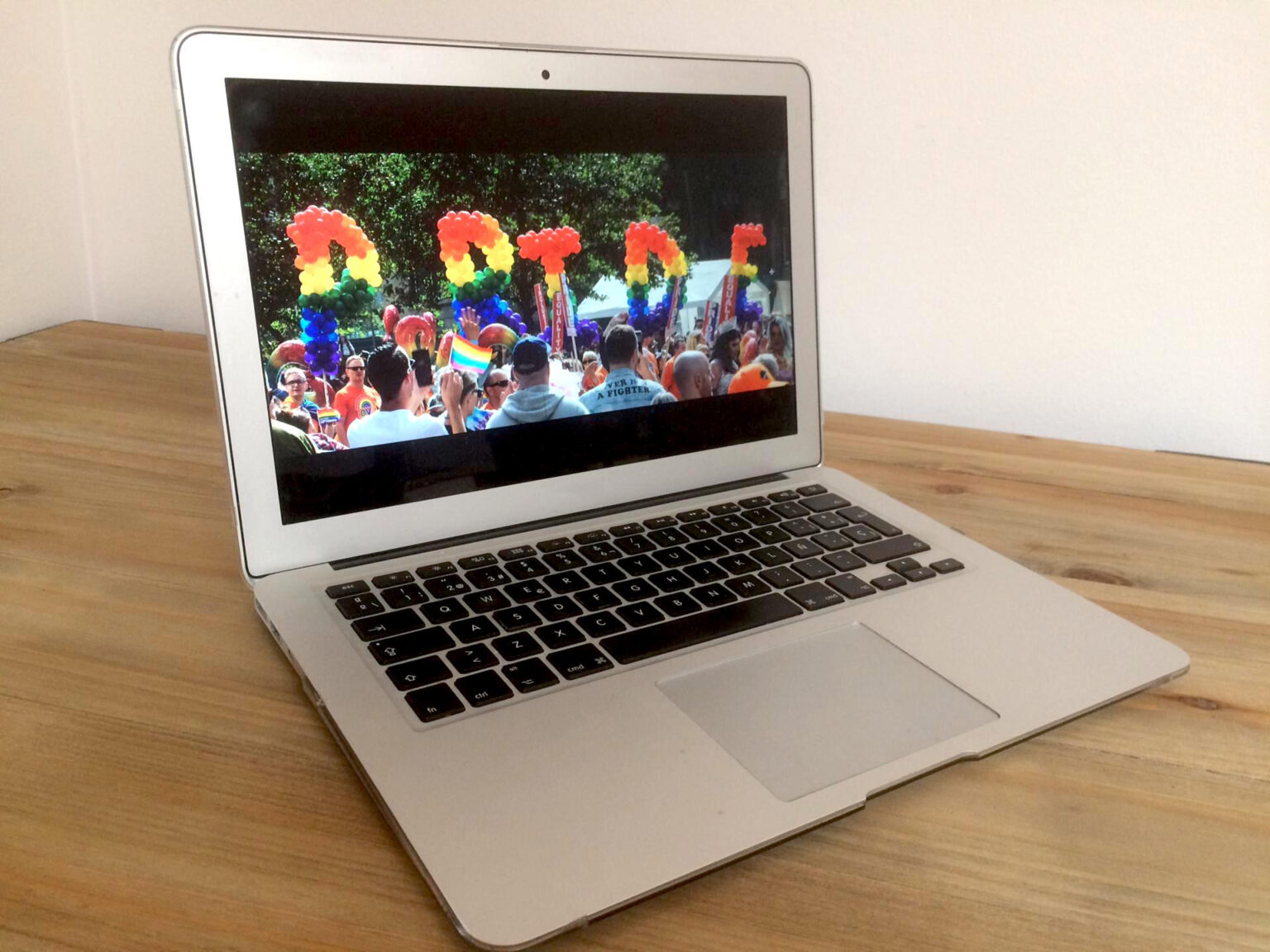
This year, Pride Month will be like no other. Despite the current challenges, it remains as the opportunity of coming together for equality and celebrating our diversity. Many organisations are getting ready for this important month of visibility by organising digital events. Are you wondering how your organisation can prevent possible attacks online this month? ILGA-Europe Programmes & Policy team shared some possible scenarios and tips for you!
With the new physical limitations to manifesting our freedom of expression and making our presence visible, most of our work has moved to online spaces which brings its benefits, but also entails an increased risk of digital security breaches. In recent weeks there have been increased indications that Pride organisers might be subject to online attacks in a more organised and active manner.
ILGA-Europe Programmes & Policy team has selected a few of the most likely possible attacks online which could be used to stop or hinder your work. Find out what they are and what you can do to prevent and mitigate them, as well as some ally organisations which might be helpful.
1. Cyberbullying, including cybertrolling and attacks on users profiles online
Individuals, usually using fake accounts or digital identities which cannot be traced to real persons, comment or post negative, or fake information to diminish the importance of your work by shifting the focus and instilling fear. Recently, a Twitter user flagged the plans of the 4chan group.
What you can do as organisers is to discuss this scenario in advance and come up with response strategies; it could be ignoring these messages altogether, deleting or diluting them with supportive messages.
2. Taking down your online resources such as websites and social media pages
These could be done by massively reporting your resources (as having violated the rules of the hosting space) or by the so called DDoS attacks on websites done through simple software available online.
A solution is to create backups with all the content of the website and pages so that it can be restored quickly on your own or alternative pages (these should also be created in advance).
Talk to your hosting providers, informing them that such a scenario is possible due to increased visibility of your group and issues. If the hosting company is international, it might be possible to look into cross-border work on this issue.
3. Attempts to get access to your internal digital resources such as e-mails, cloud storage, organisational servers, and more
This can be done in multiple ways, from phishing attempts to picking weak passwords of team members.
There is quite a lot of information online on how to prevent these types of attacks, but you should not underestimate the need to pay close attention to these types of attacks as they are still some of the most efficient tricks used by our opponents.
Here you can find a useful toolkit that offers a brief and clear visual representation on potential scenarios and ways of preventing and mitigating those.
As general tips, we suggest the following steps:
- Develop a brief protocol of actions in case of the above scenarios and inform your teams.
- Create back-up content for social media pages; create alternative pages that can immediately replace those taken down.
- Reach out to local digital security experts and ally organisations or international allies such as AccessNow’s helpline for urgent and complex situations.
COVID-19: Tips for Online Management of Financial Resources for LGBTI Organisations
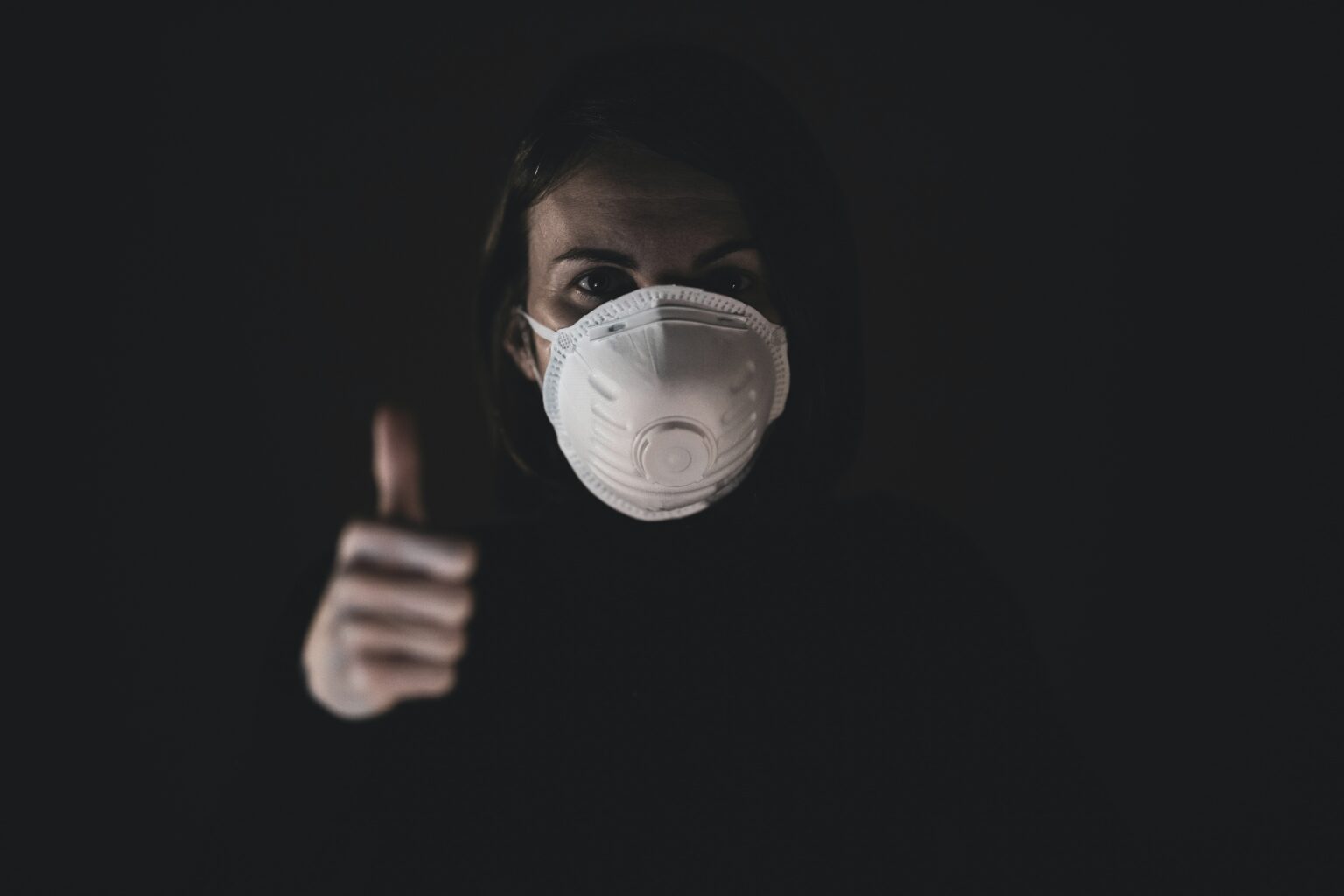
Covid-19 is having far-reaching consequences for LGBTI communities and organisations around the world. While you may currently be focussed on understanding what the immediate future looks like for your organisation and your activities, don’t forget to dedicate some time to thinking through how you are going to continue operating your finances and administration during this turbulent time.
Some risks for organisations include losing money (spending a budget line twice because of a lack of coordination), unauthorised payments, loss of financial documents, receiving (and paying) fake invoices, difficulties reporting to funders, and difficulties in obtaining instalments from funders.
ILGA-Europe has gathered some tips on how to stay on top of the practical side of keeping your organisation running during the pandemic.
States’ Positive Obligations Under International Human Rights Law During The Coronavirus Outbreak
Evidence Requirements to Hold States Accountable Through Litigation and Advocacy
Certain areas of States’ positive obligations depend on whether the State knew or ought to have known about risks, actions or inactions resulting in human rights violations. It is therefore important to collect sufficient evidence as the violations are taking place to strengthen advocacy activities and for potential future litigation; and to ensure that government bodies are being informed about potential risks and incidents. Documentation is thus a key element of legal accountability.
Obligations Of States In The field Of Human Rights In The Context Of Covid-19
In times of emergency, International and European Human Rights Law enable States to derogate from their obligations and enter a different regime of legality; provided they respect some fundamental principles. The aim of this paper is to set out the strict procedural and substantive rules States must follow when entering a situation of de jure derogation, i.e. officially notifying the international community that they will adopt measures impacting the human rights of their citizens. From a geographical point of view, the paper covers the application of derogatory measures in European and Central Asian States, to which the International Covenant on Civil and Political Rights and the European Convention on Human Rights apply.
COVID-19 and specific impact on LGBTI people and what authorities should be doing to mitigate impact
COVID-19 is generating complex challenges and risks and while the virus does not discriminate, it is very clear that it hits marginalised communities in our societies disproportionally hard. In addition, social distancing and other prevention measures, as needed as they are, can have unwanted negative impacts on the lives of marginalised groups. This should be taken into account and mitigated as much as possible.
COVID-19: Keeping LGBTI communities together
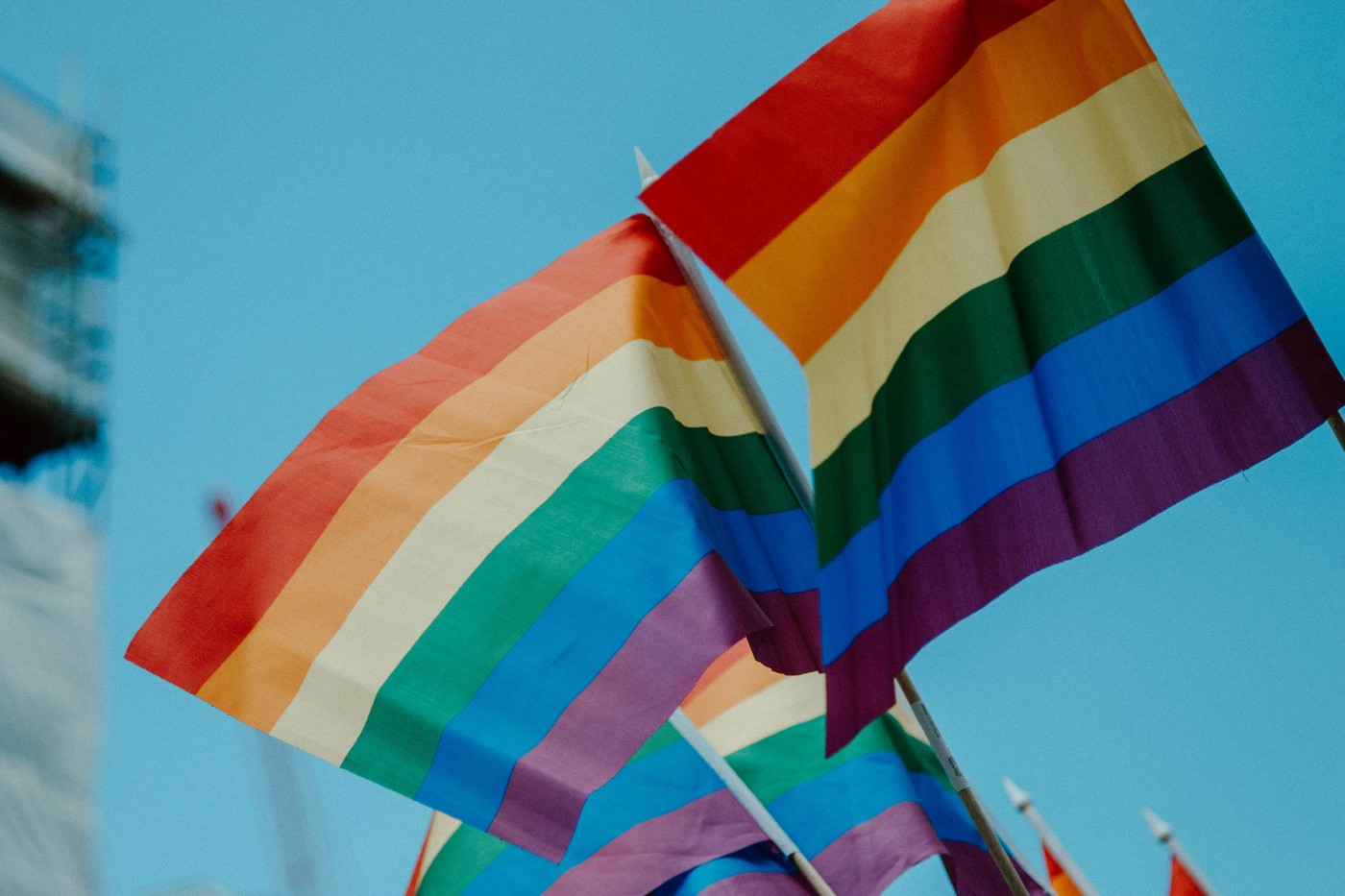
Many countries have surpassed the peak of the COVID-19 crisis and are beginning to plan phased-out endings of their lockdowns. But we’re not out of the woods yet, and if numbers of coronavirus cases start rising again, lockdown measures are most likely to be extended or reinstated, as was seen in Singapore. In a webinar presented by ILGA-Europe earlier this month, participants shared the activities and strategies their organisations have used to stay connected while confined to their houses.
Coffee on Zoom or brunch on Facetime? Following an online course together or watching a movie? For the past two or three months, LGBTI organisations have been exploring a plethora of different ways of staying connected, while providing support to their communities.
As part of ILGA-Europe’s ‘Protect, Adapt, and Rally’ three-part plan to support the LGBTI movement through the COVID-19 crisis, our webinar on Community Organising provided a space to share ideas and opinions on how to continue staying in touch, and how activists have been helping their communities and vulnerable individuals during these challenging times. Here are some of the activities our participants became involved in:
1. Individual and Community Support
- Providing antiretroviral therapy (ART) to LGBTI living with HIV.
- Creating an online peer group to provide psychological support.
- Offering online psychological support with a psychotherapist available at no cost.
- Phone and WhatsApp campaigns with volunteers offering psychological and legal support.
- Running a food provision service for trans sex workers who are unable to work.
- Creating a Facebook support group to provide information on national activities, on and offline.
- Providing online materials about COVID-19 and social distancing for LGBTI youth.
2. Coming Together
- Setting up a penpal network.
- Setting up online support groups for trans people and parents of LGBT people.
- Collaboration with other organisations
- Hosting social media live events (Facebook, Instagram) to offer a platform to members of the community.
- Virtual Coffee Lottery via Zoom, a virtual social occasion where participants are randomly paired for an online coffee meet-up
- A ‘Queerentine’ online hangout for the community to discuss various issues.
3. Fun and Entertainment
- Online meetings with LGBTI groups to play games and chat.
- Volunteering to walk with a member of the community, while socially distancing.
- Sending out newsletters with recommended activities that are accessible online, such as LGBTI events, books and movies.
- Formal and informal group meetings on social media platforms to discuss ideas on the use of time; how to be ‘sexually self-sustainable’ during quarantine; entertainment opportunities etc.
- Online yoga classes
- A charity concert for supporters, providing online space for young queer and ally artists.
Want more? Watch now our webinar on how to continue reaching out to LGBTI during COVID-19 crisis.
In this episode of our series of community organising webinars, we shared stories of how activists maintained their outreach work during lockdown and social distancing requirements across Europe and Central Asia.
What have we learned in supporting our communities as the crisis continues to persist?
Open Letter to President Ursula von der Leyen: keeping equality for all at the core amid the COVID-19 crisis
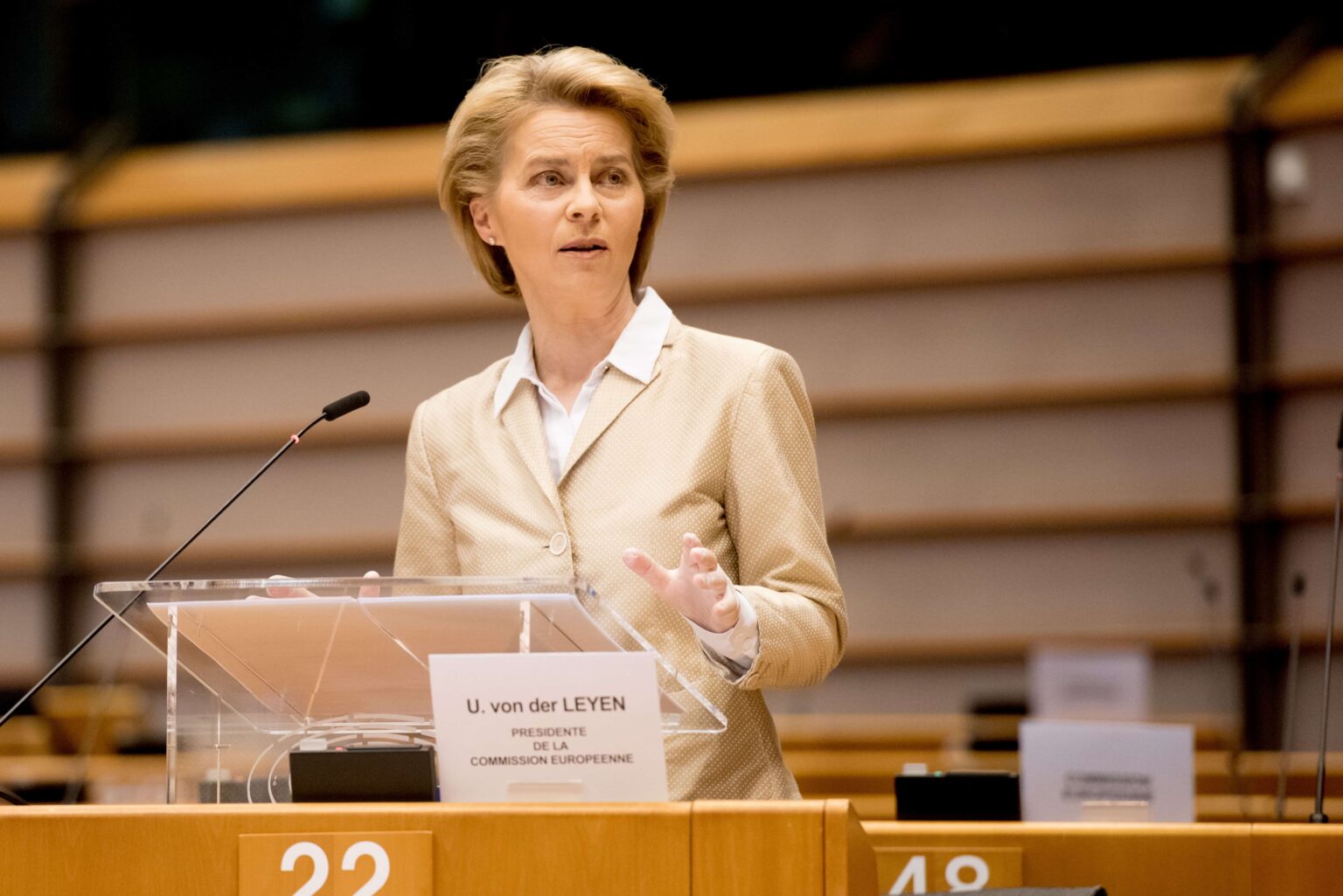
ILGA-Europe’s Executive Director, Evelyne Paradis calls the European Commission to prioritise minority and human rights. “The response to Covid-19 is bringing so many vulnerable people in our society into focus, and we cannot look away.”
Dear Commission President,
As the global Covid-19 crisis deepens, it is becoming abundantly clear that, beyond the economy, the consequences of governments’ measures to tackle the pandemic will also be profoundly social, and if not checked in a bold and timely fashion, will only further fuel existing inequalities in our societies.
As the European Commission is revising and re-prioritising its 2020 work programme, ILGA-Europe is urging you and the college of Commissioners to keep equality for all at the core of its policies.
How we respond to this public health crisis and the consequences on our economies will determine what our communities, our society, will look like once we emerge out of 2020. Rebuilding will not be and should not be about the economy only. This can and should be a watershed moment, a breaking point from which we choose to rebuild societies that are founded on a model of social justice and sustainability.
For this to happen, the European Commission needs to set out very clearly in its revised work programme how social, economic and financial measures designed to meet the challenges of the COVID 19 crisis, will be accompanied by measures tackling the inequalities and structural discrimination affecting marginalised communities.
The response to Covid-19 is bringing so many vulnerable people in our society into focus, and we cannot look away. It is the responsibility of the European Commission now to propose meaningful action on how to tackle the crisis of inequality that has become dramatically visible over the past few weeks.
Working in the LGBTI sector, ILGA-Europe is constantly being made aware of many heart-breaking situations emerging for those who are the most marginalised of an already marginalised group. Young LGBTI people are finding themselves trapped in hostile, locked-down family situations. Large numbers in the LGBTI community who are experiencing homelessness, particularly young people excluded from their families, are left unprotected by lockdowns, while the impact of Covid-19 on healthcare systems will have far-reaching effects for trans, intersex, and HIV positive-people. Meanwhile, LGBTI groups have to reinvent themselves as food banks for their communities, while financial and political pressures are quickly mounting on activist organisations and community groups, already raising concerns about the ability of many to survive this crisis.
Sadly, such experiences are shared by many marginalised and vulnerable populations at the moment. The experience of a young gay or trans person trapped in a household experience that is oppressive is shared with the experience of a woman who is stuck at home in an abusive relationship, or the experience of an older person who is living in containment with an abusive grown-up child. Beyond the people who are sick, tragically dying and their families, those most affected in Europe and around the world are the ones in precarious employment and with insecure incomes, with poor access to health care, without safe housing, from structurally marginalised communities, and undocumented migrants.
Taking concrete measures to promote equality – whether it is for LGBTI people, persons with disabilities, older people, young people, racialised minorities, gender equality, among many others – is a part and parcel of a successful recovery plan, and cannot be postponed.
If we do not address the effects this crisis is having on people’s mental health, how are we going to address the major fallout that is definitely coming down the line? If we do not ensure that equal access to health care and safe housing, how are we to ensure that public health measures will be as effective as needed to combat the pandemic? If we are not already looking at how increased social tensions in society is exacerbating the scapegoating of vulnerable groups, how are we going to counter governments who see this pandemic as an opportunity to strengthen authoritarian rule and undemocratic tendencies?
All of this needs to be part of our thinking now, and not once we’re out of this crisis.
Equality is not secondary to economies and it is not something to focus on only when we are no longer in crisis. A holistically healthy economy absolutely depends on solid structural equality. This is a crucial moment for the EU to prioritise minority and human rights, so that as we take positive steps to move out of this crisis and beyond, the fundamental principles of the European project are core, and not just perceived by governments and the people as an afterthought.
Yours sincerely,
Evelyne Paradis
Executive Director,
ILGA-Europe
COVID-19: Making online fundraising events work for your organisation
As we gear up to bring our annual fundraising event online, ILGA-Europe’s Partnerships Manager, Anna Shepherd gives her top tips for organising online events and bringing supporters on board.
The team at ILGA-Europe started planning our annual fundraising event, the European Equality Gala, way back last autumn. We came up with an exciting new theme, signed a contract with the venue and confirmed sponsors and entertainers. Then COVID-19 hit, and everything changed.
We entered lockdown and it became clear that the situation would last a while, so we needed to take a decision on whether to cancel, postpone or adapt the event. We carried out a thorough risk assessment weighing up different scenarios, financial impact, and our responsibility towards our community of supporters. In the end, we took what now seems like the only right decision to cancel the physical event and organise a virtual event instead. But how to do it?
Our Gala will go ahead on June 25 as planned, but it will be an online event. We’ll be providing our supporters a virtual space to come together, enjoy some entertainment and inspiring speakers, and contribute to strengthening the European LGBTI movement. There won’t be a cocktail bar or dance floor, but we aim to keep as much as the spirit of the Gala as possible.
Now that we’re in full swing planning the ILGA-Europe European Equality Gala Online, we want to share some tips to help your organisation, whether you’re moving a physical fundraising event online or trying out a new online fundraising concept.
Six tips for success
1. Get Your Creative Juices Flowing
Your imagination is the limit when it comes to online fundraising events: you could hold a virtual auction, raffle, quiz, drag show, concert, tutorial etc. Actual fundraising can take the form of tickets sold in advance, a suggested donation to enter, raffle and auction, or asking for donations in the run-up and during the event.
Here are a few inspiring examples of lockdown fundraising from LGBTI groups: German author Saša Staniši? gave an online reading collecting donations for Queerbase, an LGBTI refugee support group in Vienna. Drag artist Deliberately Steve did an interactive show via Zoom asking for donations to international LGBTI fund GiveOut. The Terrence Higgins Trust, a sexual health charity, are holding an online pub quiz to raise money to support people living with HIV. #EurovisionAgain is synchronised viewing of old Eurovision Song Contests every Saturday night, raising money for LGBTI charities in the UK. Diversionary, an LGBT community theatre in San Diego, held a virtual silent auction and raffle.
2. Do Some Savvy Platform Research
There’s no shortage of streaming platforms available, so do your research and choose one that best fits your idea. There’s Facebook and Instagram live; GoToMeetings, Zoom and other webinar platforms; gaming platform Twitch (yes, gaming fundraisers are a thing); and tools specifically designed for fundraising such as Givergy, GoFundMe Charity, jumblebee, GivePenny, Virtual Quiz Events.
Some are free and others come at varying fees, but price shouldn’t be your only criterion: a platform that offers a great user experience and allows easy donations directly on the platform can be worth investing some money in if it can allow you to raise more.
3. Frame The Right Message
When framing how you are going to communicate about your event, make sure you have a clear ask. Tell people exactly what donations will help achieve. You will need to let supporters know how you are supporting your communities during the pandemic crisis and what the urgent needs are.
4. Spread The Word Wisely
Think about who you want to target — as always with fundraising you want to target those who are already supportive of your cause, so think past donors and event attendees, social media followers and community members. And of course with virtual events you don’t have to limit yourself to audiences in your city or region. Then make the most of your digital communications tools — email, social media and website — to promote your event. Consider using paid promotion on social media and asking influential community members and supporters to spread the word on your behalf.
5. Plan Ahead For Smooth Running
Just like with a physical event, create a detailed running order and make sure everyone knows their role and responsibilities. Rehearse and double and triple check your tech. What’s your Plan B in case your performer’s WiFi goes down?
6. Don’t Forget Your Supporters, Post-event
Don’t forget to follow up with guests of your digital event to thank them and let them know how their support will help. Evaluate your event, get feedback and make a note of what could be improved in future events.
Further resources!
- Fundraising Chat is a Facebook group for people working in fundraising to share experiences and good practice. Not surprisingly, at the moment there’s lots of chat about virtual fundraising events and tools and tech to support them.
- Givergy, fundraising tech company offering a range of solutions such as silent auction technology, started a podcast on fundraising during COVID-19.
- Upaya, a US-based charitable organisation, held their traditional black-tie gala dinner virtually, with a twist of fun. Read their blog about their experience for some useful tips.
- GoFundMe Charity have collected advice on how to handle cancellation of a physical event and host a virtual event when plans change.
- SOGI Campaigns hosted the webinar Let’s FUNdraise For Solidarity! on May 7 and invited ILGA-Europe to take part. You can watch the recording here, in case you missed it:
COVID-19: Great resources for your LGBTI organisation

While some countries begin to plan what the end of social confinement and lockdowns will look like, the struggle to adapt to new ways of working and tackle unforseen challenges, continues for everyone. There are so many resources out there to help it’s hard to know where to begin, so as part of ILGA-Europe’s three-part plan to support the LGBTI movement through the COVID-19 crisis, we’ve hand-picked ten of the very best.
The response of so many leading organisations to the COVID-19 pandemic and new ways of working, interacting and organising amid government lockdowns, has been truly inspiring. Every day new resources come on stream, but sometimes there seems so many, it’s difficult to separate the wheat from the chaff, and figure out which ones will help you most.
ILGA-Europe’s ‘Protect, Adapt and Rally’ three-part plan aims to support the LGBTI movement and organisations through this crisis and beyond. As part of the plan, we’ve asked our staff team to recommend external resources for LGBTI groups, which will help you to manage and lead your organisation, re-think funding strategies, communicate digitally, work from home, and more. Like the three-part plan itself, this list is a living thing and we’ll be adding to it as relevant new resources come online.
1. Managing your NGO in the times of COVID-19
From staying informed to seeking support, NGOs over the world have had to rapidly adapt their activities to cope with the crisis. Easy-to-read and straight-to-the-point, this resource seeks to help you minimise or manage the disruption and financial implications at this time and the times to come as well as safeguarde the well-being of your staff and volunteers, the community, and your donors and other stakeholders.
2. Coronavirus advice for nonprofit leaders
For many organisations, COVID-19 is not the first big crisis they have faced. Here, you will find some tips on how to lead and continue the work for our communities, based on learnings from previous comparable crises, such as 9/11.
3. Face-to-face fundraising in the COVID-19 crisis
Hear from five international face-to-face fundraising specialists on how their organisations are adapting their teams and activity due to COVID-19 in this one-hour panel discussion.
4. 8 Learnings for your virtual gala
Before the lockdowns started in many countries, this non-profit took the timely decision to cancel their major annual fundraising event and host a virtual Gala instead. In this great resourse, they share their top takeaways.
5. Communications best practices during the COVID-19 pandemic
Whether you are part of the communications’ team within your organisation or not, communication is more and more part of your daily activity during this crisis. Here you will find practical tips and examples to communicate effectively right now.
6. 5 ways to leave work at work (even if you never leave the house)
While working from home many of us are experiencing signs of burnout very quickly. In this really informative blog you will find some suggestions on how to plan your work at home, especially if it’s the first time you’ve had to do so.
7. Tips for remote teams
This is a great list of tips for synchronised work, clear communication, online meetings, and much more.
8. Ergonomic tips when teleworking
In this short video from the International Labor Organisation’s Occupational Safety and Health coordinator, Eloy Alonso-Maestre, there’s plenty of practical guidance on how to make your home-working life more comfortable, from how to comfortably sit to best working practice with a smaller screen.
9. Building virtual rooms for online facilitation
Here you will find templates for online facilitation sessions, using creatively shared documents and tools. Training for Change provides workshops, guides and tools for movement and capacity building, click here for more.
10. How to alleviate Zoom fatigue
Since the COVID-19 pandemic hit, we’re on video calls more than ever before — and many are finding it exhausting. This resource from the BBC provides some handy tips for using the platform without burnout.
11. The definitive guide to facilitating remote workshops
If you are a workshop facilitator struggling with digital life, this guide is for you. In it you will find insights, tools and case studies from digital-first companies and expert facilitators.